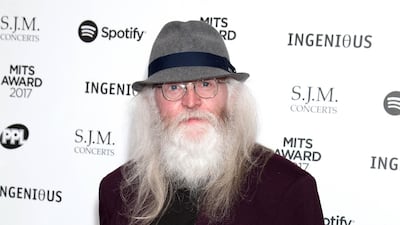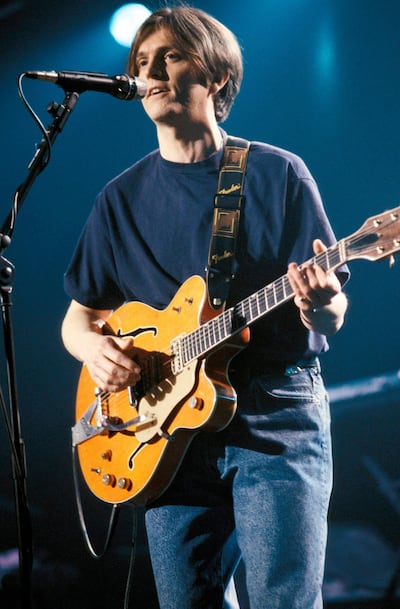The second act of a rock career tends to have a familiar narrative, especially for artists who reappear after an extended hiatus. It goes something like this: first, settle whatever differences drove your band apart, or find suitable personnel for a new one; second, think about recording some fresh material; third, and most important, get out on the road and play the old classics.
It is a story we're particularly aware of in the UAE, where many so-called heritage acts come to play shows. It should be said that this diet of the familiar may be more to do with cautious bookers than a real indication of the nation's musical tastes, but here's a sample. Guns N Roses closed the Asian leg of their world tour in Abu Dhabi last year with most of their original members on stage, even if their set was briefer than expected. Next month, Busted, an English teen-focused pop-punk band popular a decade or so ago, and the Hothouse Flowers, an Irish group who rose to fame in the late 1980s, play in Dubai. The month after that, Boyzone, who split for seven years at the turn of the century, arrive there. Both Dodgy and Toploader, who rode the 1990s Britpop wave, are booked to play the Sunset festival in Abu Dhabi in April.
That’s the conventional trajectory. But what if your career and even your life has deliberately defied convention? How does the second act look then?
This month, Prefab Sprout, released their first album for six years. Actually – as is typical of this band – it's not quite that simple. In reality, I Trawl the Megahertz first surfaced in 2003 as a solo album by frontman Paddy McAloon. Now, 16 years later, it has been recontextualised, remastered and reissued under the band's name.
It’s a wonderful, melancholic, against-the-grain journey that certainly fits comfortably into the Prefab Sprout canon. The title track is 22 minutes long, while McAloon only sings on the seventh of the album’s nine songs. The voice of a female narrator, Yvonne Connors, punctuates some of the material. Elsewhere, fragments of speech litter the listener’s path.
Its songs, sometimes skittish, always affecting, defy easy categorisation. In fact, listening to it is akin to happening upon an architectural ruin, overcome by weeds and rough weather. The roof has begun to cave in, but the splendour of its walls is still obvious.
There’s also a confluence of grand ambition and incoherence. According to McAloon, it’s the sound of “people pouring out their troubles”. The album might also have matured into the perfect soundtrack for his home country today, as it wrestles with the anxieties of Brexit and the likelihood of a prolonged season of popular discontent.
Prefab Sprout formed in Newcastle in 1978 and rose to prominence in the 1980s – another period of widespread political rancour in the UK. In that time, they recorded a series of critically acclaimed albums, most notably 1985's Steve McQueen and Jordan: The Comeback, released in 1990.
They are, however, best known for their 1988 hit single The King of Rock N Roll, an upbeat, straightforward tune that its author later described as a "kiddie record". Not surprising, considering that McAloon was the prince of sophisti-pop – the inelegant portmanteau applied to a wave of contemporary bands, including Aztec Camera and Scritti Politti. Good company to be in, but even that label undersells just how refined and innovative McAloon's work really was.
I Trawl the Megahertz is all of that, with an added introspective edge. And with good reason.
McAloon has endured years of health complications. In a recent interview, he mentioned that he has had "eye problems", a stoic way to describe the two years he was largely bed-bound, as he recuperated from retinal detachment surgery. In 2006 he was also diagnosed with Meniere's disease, an inner ear disorder that can lead to vertigo, tinnitus and hearing loss. The condition has flared up since. His story is a reminder that growing older is a complicated road we all have to travel.
McAloon added that established artists are “often faced with this dilemma: change and disappoint fans, or stay the same and disappoint fans”.
Unlike those bands working their way down the heritage trail with a set full of hits, McAloon continues to do things differently. All things considered, touring is not really an option for him these days. To be fair, he wasn’t keen on it in the first place. Instead, his second act involves changing and, somehow, staying the same. The former in aesthetic – now he sports a long white beard, far removed from his sleek haircut of the Eighties – and the increasingly experimental nature of his work. The latter in the nuanced attention to detail he continues to apply to it.
We should not be surprised by any of this. McAloon was never one to stick to the established script. Long may he continue to write his own.
Nick March is an assistant editor-in-chief at The National



